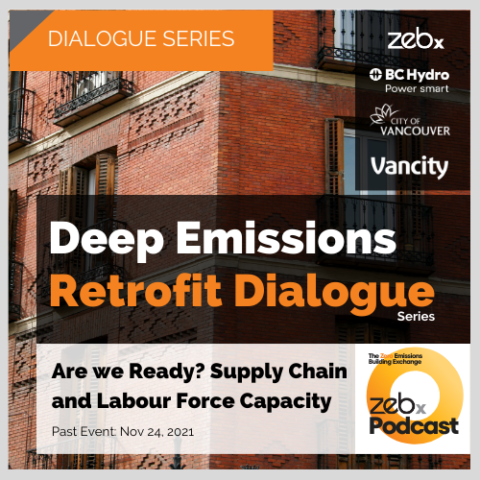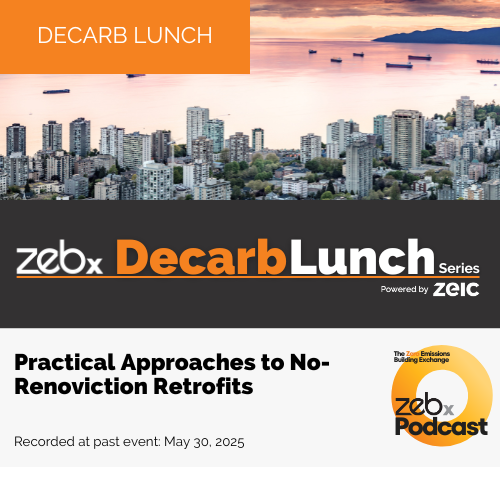
Deep Emissions Retrofit of a 1968 Office Tower
November 16, 2021
A Deep Retrofit of Crown Manor
November 27, 2021
Deep Emissions Retrofit Dialogue Three – Are we Ready? Supply Chain and Labour Force Capacity
Recorded at Past Event: Nov 24, 2021
Slides:
This event was a collaboration with the Canada Green Building Council (CaGBC).
Summary
The biggest source of future operational emissions from the building sector will come from existing, rather than new buildings. Retrofits which prioritize massive reductions in operational emissions are essential to address the climate crisis and will need to be scaled up dramatically over the next decade. In British Columbia, electrification is the most effective strategy to achieve deep, immediate, and real emissions reductions.
This Deep Emissions Retrofit Dialogue was the third in a six-part series focused on deep emissions retrofits. It was co-hosted with the Canada Green Building Council (CaGBC). The three presenters kicked off the session with presentations focused on HPSC’s Home Performance Contractor Network, the Canadian Green Retrofit Economy Study co-authored by CaGBC and the Delphi Group, and the Heat Pump Technology Attraction Study co-authored by Dunsky Energy + Climate and FRESCo.
Building a Network of Qualified Contractors
Presented by Greg Bloom, Home Performance Stakeholder Council (HPSC)
Greg presented the HPSC’s Home Performance Contractor Network (HPCN). The HPCN is a database of accredited and qualified retrofit contractors in BC that meet specified trade designations and training qualifications and are subject to ongoing review and quality assurance checks. In essence, the HPCN has been set up to ensure the best possible outcome for homeowners looking to renovate or retrofit their homes and make them more energy efficient. Currently, the HPCN is open to retrofit contractors in BC that replace windows and doors, heating, cooling and ventilation equipment, and insulation. Soon, the network will likely expand to include accreditation and qualification of renovation contractors and energy advisors. HPCN contractors have access to subsidized training and are listed in a custom homeowner search tool. Membership in the HPCN is a mandatory eligibility requirement for select rebates from CleanBC, BC Hydro and FortisBC.
Through its extensive engagement with BC’s renovation and retrofit contractor community, HPSC was able to convey the following systemic issues facing the contractor community:
- supply chain issues related to HVAC equipment, glass for fenestration and insulation
- awareness of regulations and permitting requirements
- necessity for residential retrofit best practices, including testing
- capacity of the workforce to meet the demand
Canadian Green Retrofit Economy Study: Preliminary Findings
Presented by Ben Clark, Delphi Group
The goal of the study was to equip government and industry with insight about the key steps they will need to take to support a competitive, modern and low-carbon building supply chain. The study focused on workforce and supply chain opportunities presented by Canada’s Part 3 (large buildings) retrofit economy. Our zero-emissions community got a sneak peak of the study’s preliminary findings.
According to the study, Canada’s green building workforce will need to more than triple by 2030 to meet demand for sustainable building construction and renovation. This will need to be accompanied by the development of a robust supply chain and new, large public and private investments to enable green building retrofits at scale.
Some of the preliminary findings of the study were:
- Currently the business case for deep energy retrofits is weak in many areas, with a disconnect between policy makers, building owners, and contractors
- To decarbonize the existing building stock by 2050, we need to move from isolated retrofit projects to a systemic approach in developing local retrofit markets
- There is a better market for integrating solar PV and renewables outside of BC, where energy is less regulated
- For some portfolios, mechanical system upgrades are common, while large building envelope upgrades are only happening at the end of its service life
- Electrical capacity is a barrier for fuel switching, but heat pumps and other measures can help free up the available load
Delphi Group also prepared a series of great questions to guide the panel and attendees in the post-presentation discussion. The final study was presented in June 2022 and can be found on CaGBC’s website here.
VEC Heat Pump Technology Attraction Study: Preliminary Findings
Presented by Stephanie Willis, Dunsky Energy + Climate Advisors
The Vancouver Economic Commission (VEC) engaged Dunsky Energy + Climate Advisors and FRESCo to identify the technology needs, availability, gaps, barriers and opportunities for heat pumps in BC. The findings from this study are being used to develop VEC’s proposed strategy to increase the supply of heat pumps in the market to help meet BC’s ambitious goals for building decarbonization. Our zero-emissions community got a sneak peak of the study’s preliminary key findings. These included:
- the key drivers for demand are building codes, incentives, the provincial carbon tax and the increased demand for cooling
- the heat pumps currently available on the market can meet most of BC’s heating electrification needs, but the industry is not familiar with the full range available products
- there is a need for more heat pumps with low global warming potential refrigerants like propane and carbon dioxide
- for retrofits, there is need for air-to-water heat pumps capable of producing high-temperature hot water for hydronic heating applications
- there is a need for more low-capacity heat pumps that can match the low heating requirements of highly energy efficient buildings
The presentation also included an analysis of the main market and supply barriers for heat pumps, as well as a forecast of the next steps VEC will take to create a heat pump attraction strategy for BC.
Presenters
Greg Bloom, Manager of Industry Relations, HPSC
As a carpenter, trainer and lifelong learner, Greg has an extensive background in the new home building, commercial and residential retrofit industries in BC. This includes building and managing residential single to multifamily new build and renovation projects, working with retail box chains as a national trainer, coaching and facilitating industry best practices – and taking every opportunity in continuing to learn new best practices within the industry and related programs. Before joining the HPSC, Greg was the owner of a residential renovation consulting company. Now with the HPSC, Greg leads industry engagement, advocacy, and policy development as the Manager of Industry Relations.
Ben Clark, Senior Consultant, The Delphi Group
Ben is a climate and sustainability professional with 15 years experience in government, non-profit organizations, and the private sector. As a Senior Consultant and Project Manager with The Delphi Group, he leads research, engagement, and strategy development projects across sectors in the green economy. Ben’s recent project experience includes assessing the readiness of professions and developing KPIs for the BC Energy Step Code, implementing a Single-use Item Reduction Strategy for the City of Surrey, and developing a sector framework and growth scenarios for BC’s Watershed Sector. Prior to his current role, he worked for the Province of BC for 10 years in climate action and adventure tourism sector development. Ben is also passionate about place-based food systems and volunteers with a number of related initiatives in Victoria.
Stephanie Willis, Senior Analyst, Dunsky
Stephanie Willis, M.Eng., is a Senior Analyst at Dunsky with 6 years of experience in heating electrification, energy efficiency and technology development. She has worked extensively on modelling the GHG, energy, and economic impacts of energy efficiency and electrification measures for buildings in jurisdictions across the U.S. and Canada. Stephanie developed the Dunsky HEATTM model from the ground up and implemented it for several projects, including multiple cost effectiveness studies on the decarbonization of heating for Canadian gas distributors. As a data geek and a climate hawk, Stephanie tries to contribute to climate change mitigation through a ‘numbers not adjectives’ approach
Hosts
Roberto Pecora, Director, ZEBx
Akua Schatz, Vice President, Market Engagement and Advocacy, CaGBC






